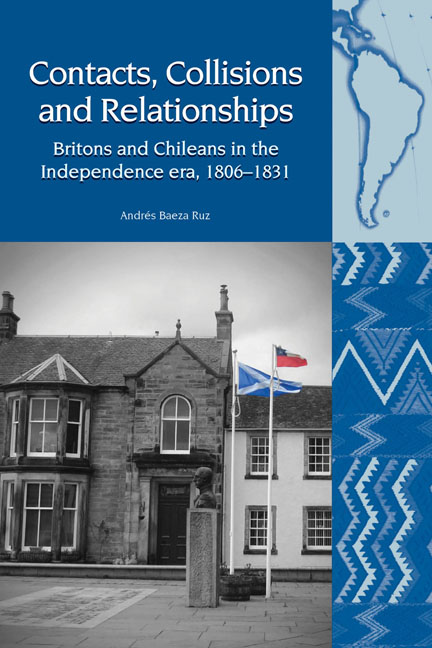Book contents
- Frontmatter
- Contents
- Acknowledgements
- Abbreviations
- Preface
- Introduction
- 1 Invasions, Negotiations and Conspiracies: British-Chilean Relations in an Era of Change, 1806–1817
- 2 Cultural Encounters Offshore: Britons and Chileans in the Chilean Navy, 1817–1823
- 3 Bibles, Schools and Citizens: British Protestant Missionaries and Educators in Chile, 1817–1831
- 4 British Merchants, Private Interests and the Fostering of Free Trade in Chile, 1811–1831
- 5 Beyond Diplomacy: The Cultural Significance of British Recognition of Chile's Independence, 1817–1831
- Conclusion
- Bibliography
- Index
2 - Cultural Encounters Offshore: Britons and Chileans in the Chilean Navy, 1817–1823
- Frontmatter
- Contents
- Acknowledgements
- Abbreviations
- Preface
- Introduction
- 1 Invasions, Negotiations and Conspiracies: British-Chilean Relations in an Era of Change, 1806–1817
- 2 Cultural Encounters Offshore: Britons and Chileans in the Chilean Navy, 1817–1823
- 3 Bibles, Schools and Citizens: British Protestant Missionaries and Educators in Chile, 1817–1831
- 4 British Merchants, Private Interests and the Fostering of Free Trade in Chile, 1811–1831
- 5 Beyond Diplomacy: The Cultural Significance of British Recognition of Chile's Independence, 1817–1831
- Conclusion
- Bibliography
- Index
Summary
Introduction
As shown in the previous chapter, Britain maintained a policy of neutrality during the wars for independence between Spain and its colonies. As a result, relations between Chile and Britain were largely enacted by ‘non-state’ actors, like merchants, educators, missionaries, military and seamen, although the Chilean governments of the period still sent envoys to London to negotiate support for the cause. This chapter delves into the role played by one of these ‘non-state’ actors: British seamen who participated in the newly created Chilean navy from 1817 and their interactions with their Chilean counterparts.
The end of the Napoleonic wars in 1815 was a crucial factor in why there were so many Britons willing to travel to South America to take part in a war that was not directly relevant to them. The reduction of both the Royal Navy and Army left thousands of soldiers and seamen unemployed. The intensification of the war in Spanish America was a new opportunity and many travelled to South America in search of a new ‘adventure’ and were attracted by the financial benefits offered by the newly independent governments.In the case of Chile, most Britons and Irish who took part in the war for independence joined the newly created Chilean navy (1817). Although some had settled in Chile even before that, the appointment of Thomas Cochrane as Vice Admiral of the Chilean navy (November 1818) led about nine hundred British and Irish seamen to travel to Chile. The involvement of these seamen in the wars of independence was not part of British policy. Indeed, in 1819, the Parliament passed the Foreign Enlistment Act, which sought to prevent British subjects taking part in this war, a law that was obviously linked to the policy of neutrality. Thus, these seamen joined the navy of Chile as individuals rather than as British state agents.
By this point, Chileans’ perceptions of and attitudes to Britons had changed quite radically. They shifted according to the development of the war in Europe and the role played by Britain in this conflict. By 1818 the war in Europe had finished and Chile had declared its independence from Spain on 12 February. This was a new reality from the period analysed in the previous chapter.
- Type
- Chapter
- Information
- Contacts, Collisions and RelationshipsBritons and Chileans in the Independence era, 1806-1831, pp. 67 - 109Publisher: Liverpool University PressPrint publication year: 2019

